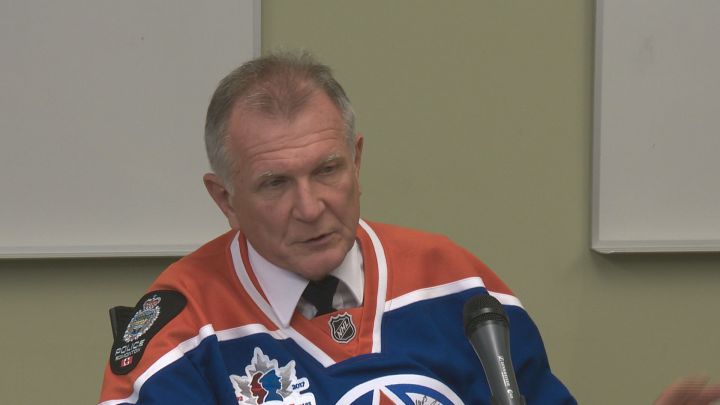The Edmonton Police Service’s new policy of not releasing the names of all homicide victims has been met with mounting questions and concerns raised by local media and politicians but at a news conference on Monday, Edmonton Police Chief Rod Knecht defended the practise.

“I understand the confusion by the media,” he said. “I would be asking the same questions and I think you’re right to ask those questions: Why is it different in one jurisdiction as opposed to another jurisdiction?
“I’m pretty comfortable with what I’m being told. We don’t want to be breaking the law and we absolutely want to have respect for the victims.”
Since the new year, the Edmonton Police Service (EPS) has in several instances not revealed the names of homicide victims, something that was previously common practice except under extraordinary circumstances. The EPS’ new approach is not currently being followed by some other law enforcement agencies in Alberta, such as the RCMP and the Calgary Police Service (CPS).
READ MORE: 2 bodies found in southwest home; Edmonton homicide detectives investigating
Knecht said on the advice of his police department’s lawyers, the EPS is more closely scrutinizing when it releases the names of homicide victims to ensure they are not breaching Alberta’s Freedom of Information and Protection of Privacy Act (FOIP).
“At the end of the day, FOIP is a law,” Knecht said. “We have to obey the law and we have to respect the rights of victims and accused quite frankly as well.
Knecht said his lawyers say they believe FOIP law indicates the names of homicide victims should only be released in cases in which doing so could help to forward a police investigation.
READ MORE: 53-year-old woman murdered in northeast Edmonton was stabbed to death
“The FOIP Act includes a provision (section 32) requiring a public body to disclose information, including personal information, without delay, to the public, an affected group of people, to any person or to an applicant, if the information is about a risk of significant harm to the environment or to health and safety (section 32(1)(a)); or disclosure is, for any other reason, clearly in the public interest (section 32(1)(b)),” a government document about FOIP reads.
Knecht said his department is attempting to help the media by suggesting they make FOIP requests when police cannot name victims or to alert police if a victim name is already publicly available in a court document.
At one point, Knecht was challenged by a reporter on three specific homicides in which they said the families of the victims had already either spoken with media or made their stories public through GoFundMe pages. The reporter also pointed out that in those cases, the victims’ names were already a matter of public record as they appeared in court documents.
However, a government bulletin about Alberta’s FOIP laws also warns against public bodies not being transparent enough with the public.
“Public bodies that regularly receive requests of this nature should have strategies in place to provide as much information as possible in the circumstances, while observing their duty to protect personal information,” the document reads. “When a public body simply refuses to comment on a matter for reasons of privacy, the public body can appear to the public as defensive, or even secretive, and this tends to bring privacy legislation into disrepute. This approach can also be frustrating to public bodies, which can feel that they are unfairly cast in a negative light by being unable to comment on the facts of the specific case.”
FOIP laws also allow for the release of private, personal information in cases where the public safety or public interest warrants it, however, it does not specifically outline a threshold for such cases to meet.
READ MORE: Edmonton police identify man they believe could have info on March homicide
“This is a balancing act all the time,” Knecht said. “The public’s right to know and the victims’ right to their privacy… homicides are very, very public events.
“We’re trying to get it right. I’m not suggesting that we have it absolutely right. I think you [media] should continue to challenge us. We just want to make sure we are getting it right.”
Knecht said he believes if there is consistency on the matter in all law enforcement jurisdictions it would serve everyone’s interests.
“We should have some consistency here, this is obviously something that I think the Alberta Association of Chiefs of Police has to have a discussion around because we should have one policy so you folks aren’t confused, the public isn’t confused, and quite frankly our police officers aren’t confused either… I think there is some confusion out there.”
The EPS chief said aside from ensuring his police department is compliant with FOIP laws, he also sees the new policy as a way to protect homicide victims and their families.
Global News reached out to Alberta Justice to ask for a response to Knecht’s comments on Monday. Justice Minister Kathleen Ganley issued the following statement:
“The decision to release a homicide victim’s name is handled by individual police services. However, I believe it’s important to have consistency across the province which is why I’ve asked my department to reach out to the Alberta Association of Chiefs of Police to get a better understanding of current practices in the province.”




Comments